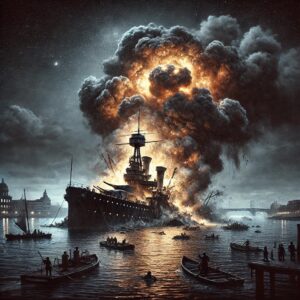On the night of February 15, 1898, a massive explosion rocked the USS Maine, a U.S. Navy battleship anchored in Havana Harbor, Cuba. The blast tore through the vessel, killing 266 American sailors and plunging the nation into mourning. The mysterious destruction of the Maine became the catalyst for the Spanish-American War, fueling tensions between the United States and Spain. Though the true cause of the explosion remains a subject of debate, its immediate effect was undeniable: cries of “Remember the Maine, to hell with Spain!” echoed across the country, rallying public support for war.
At the time, Cuba was under Spanish rule, and the island was embroiled in a struggle for independence. The United States, already sympathetic to the Cuban rebels, had sent the Maine to Havana as a show of support and protection for American interests. When the ship exploded, yellow journalism—sensationalized reporting from newspapers like The New York Journal and The New York World—seized the moment, fanning the flames of war with dramatic headlines blaming Spain. The U.S. government, under President William McKinley, demanded answers, but when diplomacy failed, Congress declared war on Spain in April 1898.
The Spanish-American War was brief but transformative. In just a few months, U.S. forces achieved decisive victories in Cuba and the Philippines, signaling America’s emergence as a global power. Spain, unable to withstand the American military onslaught, surrendered in August, ceding control of Cuba, Puerto Rico, Guam, and the Philippines to the United States. Though the war was over, the explosion of the Maine remained an unsolved mystery. Modern investigations suggest that the blast was likely caused by an internal coal bunker fire igniting ammunition rather than a Spanish attack. However, at the time, the prevailing narrative served its purpose—ushering the U.S. into a war that reshaped its role in world affairs.
The USS Maine’s tragic end is a reminder of how a single event can alter history. Whether an accident or an act of war, its explosion led to a conflict that reshaped the geopolitical landscape and cemented the United States’ influence overseas. More than a century later, the Maine remains a symbol of the power of media, the complexities of war, and the lasting consequences of a moment in history.

